Transgenerational biocontrol against root-knot nematode following priming by biocontrol fungus
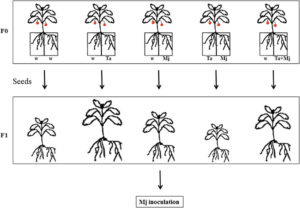 Root-knot nematodes including Meloidogyne javanica are major agricultural pests. Previous studies have shown that biocontrol agents including species of the fungal genus Trichoderma interfere with root-knot nematode pathogenicity, directly through effects on the nematode, and indirectly through a stimulation of plant defenses (priming). Medeiros et al. investigated the mechanism of priming by Trichoderma atroviride, using a tomato split-root system in which the pathogen and biocontrol agent could be inoculated seperately or together. In roots exposed to the nematode, there was an enhancement of resistance when the fungus was co-inoculated or inoculated on the other root half as compared to the no-fungus control, indicating direct and indirect biocontrol effects. Furthermore, the defense enhancement conferred by the fungus was passed on to the progeny; all of the progeny of plants treated with the biocontrol fungus showed enhanced control of the nematode. The mechanism of this heritable priming, which presumably involves epigenetic changes, is yet to be determined. Scientific Reports 10.1038/srep40216
Root-knot nematodes including Meloidogyne javanica are major agricultural pests. Previous studies have shown that biocontrol agents including species of the fungal genus Trichoderma interfere with root-knot nematode pathogenicity, directly through effects on the nematode, and indirectly through a stimulation of plant defenses (priming). Medeiros et al. investigated the mechanism of priming by Trichoderma atroviride, using a tomato split-root system in which the pathogen and biocontrol agent could be inoculated seperately or together. In roots exposed to the nematode, there was an enhancement of resistance when the fungus was co-inoculated or inoculated on the other root half as compared to the no-fungus control, indicating direct and indirect biocontrol effects. Furthermore, the defense enhancement conferred by the fungus was passed on to the progeny; all of the progeny of plants treated with the biocontrol fungus showed enhanced control of the nematode. The mechanism of this heritable priming, which presumably involves epigenetic changes, is yet to be determined. Scientific Reports 10.1038/srep40216


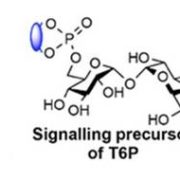

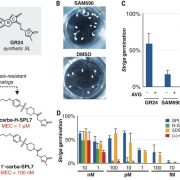
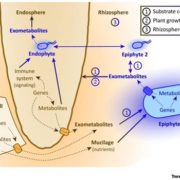

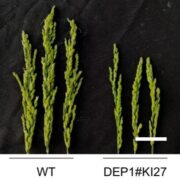


Leave a Reply
Want to join the discussion?Feel free to contribute!